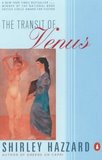Transit of Venus by Shirley Hazzard
 Hazzard's story is of two sisters, Grace and Caro, who lose their parents during WWII when a ferry sinks in Sidney Harbour. They live with an older half sister, Dora, whose goal in life is to feel she's a martyr while getting as much as possible from other people. Grown up, the sisters are taken by Dora to England where, with other colonials, they can patronized by the English who are sensitive about the place in the world they have lost. They scrape by, Caro passing the test to get a job in a government office where work is routine and discipline, rigid and sexist and Grace taking a job at Harrods. It is the 1950ies.
Hazzard's story is of two sisters, Grace and Caro, who lose their parents during WWII when a ferry sinks in Sidney Harbour. They live with an older half sister, Dora, whose goal in life is to feel she's a martyr while getting as much as possible from other people. Grown up, the sisters are taken by Dora to England where, with other colonials, they can patronized by the English who are sensitive about the place in the world they have lost. They scrape by, Caro passing the test to get a job in a government office where work is routine and discipline, rigid and sexist and Grace taking a job at Harrods. It is the 1950ies.The novel begins with a storm near a country house where the sisters are guests of the family of Grace’s fiancé. The father is a renowned professor of astronomy and his prize student, Edmund (“Ted”) Tice, is also visiting. (It is not accidental that it is astronomers that study the transit of Venus.) A body was found that weekend where a bridge had been washed away in a flood caused by the storm. Mrs. Thrale’s (for that is the name of the professor) godson, a neighbor and a budding playwright, the son of the poet Rex Ivory, is also in attendance that week-end, thus establishing the novel’s primary characters. Caro, who unlike Grace, does not marry early and produce a family, is the main focus. Paul Ivory becomes her lover and Ted Tice falls in love with her that weekend. The reader will forget about the body that’s swept away until the end of the novel.
This is the best novel I have read in a long time. I was confused at the beginning—took awhile to get into it—same experience reading Hazzard’s The Great Fire. So I slowed down, began to look up the snippets of poetry quoted in the text (easy—in most cases, typing a line into Google will tell you where it’s from) and thinking more seriously about the language. The prose is not “poetic” in the usual sense of “gorgeous language” by which most people mean it “sounds beautiful”. But it’s poetic in the sense that meaning percales up from words and images and figures of speech and allusions. Metaphoric language, starting with the title. A “transit of Venus” is like an eclipse of the Sun, only it’s the planet Venus that passes in front of the Sun. It happens roughly twice a century. Those two times are referred to as a pair because they occur within a few years of each other and there’s a long time before the last and after the next transit. (If you’re curious, the last one was in June of 2004 and the next one is in 2012, which means we’re in the middle of one transit pair.) Now the question is what does Venus (love?) crossing in front of the sun suggest? Especially since, unlike a total eclipse of the Sun (by the moon) Venus crossing in front of the sun is not a big enough blot to obscure the sun? Hazzard plays with this figure in several places in the novel, at two points in Caro’s life which may stand for the pair of transits. The first is where Caro has been left by Paul because his wife, for whom he left Caro only to come back shortly after the honeymoon as lover, will soon bear him a son. Caro is heart-broken (for she loves Paul against all better judgment). Caro is also nearly destitute—with no money (inheritance given to Dora), a cold flat and a deadend job. She dreams of being crushed by the stones at Avebury (where she and Paul first made love) and muses on death in general and her own death. She hypothesizes that death must be enacted to achieve meaning—and then the meaning is total, as for nothing else in life. She calls the phenomena “the Black Drop” after the optical phenomena which plagued scientists trying to measure the distance from the earth to the sun at the time of the transit of Venus. The other transit—if that’s what these are metaphorically—comes at the dénouement of the novel where Caro understands the love she’s turned her back on her entire adult life.


1 Comments:
I had read an interview with Hazzard, and got this book, as well as two collections of her short stories. I really appreciate her writing.
Post a Comment
<< Home